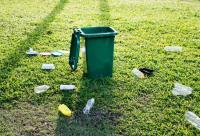 Add My Company
Add My Company
Sign In

There are some 6 million people in the UK suffering from food poverty, yet the introduction of the Plastic Tax will inevitably add some £400 million to the nation’s food bill, whilst adding to Global Warming.
There is already a shortage of polymer from PCR waste, thus retailers will either pay the tax or use substitute materials.
From April 2022, plastic packaging without 30% recycled content will be taxed at £200 per tonne. As currently the UK Food Industry uses some 2 million tonnes of plastic food packaging per year, the additional tax on the industry will be some £400 million.
Whist it can be argued that this extra tax can be avoided by using packaging with 30% recycled content, this proposal has the following major flaws;
1) The recycled film needs to be accredited for food contact.
2) There is not sufficient plastic recycling capacity available to achieve this accreditation standard.
3) What film is available is circa 50% more expensive to produce than virgin material.
As a consequence, it will be more economical for the food manufacturers /packers, along with packaging manufacturers and retailers to pay the tax. Eventually the Government will realise this is happening and its response will undoubtedly be to increase the tax to encourage ‘more recycling!! Thus, year by year this tax will be increased.
Current estimates by the Trussell Trust are that there are circa 4.6 million people in the UK, (7%) suffering from ‘food poverty’. It also suggests there are over 2000 food banks giving away food and that there has been a 33% increase in the use of these facilities in 2020 to 2021.
Against this background, it’s reasonable to conclude this additional tax on food, by the Government, will result in more people unable to afford to secure an adequate and nutritious diet. This is the Government\’s own definition of food poverty. An equally perverse consequence of this legislation is that the UK Is a nett importer of packaging film, indeed apart from the Innovia Plant in Cumbria, the UK does not have any major OPP production facilities. As OPP film is a key constituent of plastic food packaging, we will effectively be importing other countries recycled waste materials. Even if 30% recycled content figure is achieved.
It is difficult to believe that increasing food poverty and importing other countries waste were high on the Government list of priorities when they decided to introduce the Plastics Tax but that; exactly the outcomes that will occur.
Extended Producer Responsibility (EPR)
At the current rate of progress, the Government is planning to introduce EPR by late 2023 or January 2024. The proposal is that the Packaging Industry will pay for the cost of collection, separation, and disposal (recycling) of its waste. In effect, this will transfer the costs and responsibility of the management of all packaging waste from the public sector (Local Authorities) to the private sector (Packaging Suppliers).
One suspects there will be no reduction in business rates as a consequence of this transfer of the costs involved, albeit the current packaging recovery note system (PRN’s) will be abolished.
The financial consequences to the Packaging Industry, particularly plastics, are likely to be horrendous and the table below indicates why this is : –
PRN % Recycling Targets (DEFRA)
Paper Glass Aluminum Steel Plastic Wood
79% 81% 66% 86% 59% 35%
PRN Average Charge Per Tonne ( Est 2021)
£6.50 £46.25 £17.75 £13.50 £85.00 £6.00
From this, it can be seen that, not only does plastic pay significantly more per tonne than any other material for packaging recovery, but it pays virtually the equivalent per tonne of all the other materials added together. If this cost bias is to be maintained, it means that plastics will pay the highest share of the £2.7 billion estimated cost of EPR. Once again this will increase the cost of food, the consequent increase in the number of people in food poverty.
The Environmental Consequences
The inevitable consequence of increasing plastic packaging prices disproportionately relative to other packaging materials (which the Plastic Tax and EPR will achieve) is the substitution of plastics with alternative packaging materials. This will result in an increase of CO2 emissions, (global warming), waste generated and greater depletion of the Earth’s natural resources.
Extensive research has been undertaken to evaluate the potential environmental cost of plastic packaging substitution with alternative materials, two examples of which are as follows;
The USA
Life cycle analysis (LCA) for the American Chemistry Council by Franklin Associates, a leading American research company concluded that using plastics for food packaging:
• Saves enough energy to fuel 18 million passenger vehicles
• Saves enough water to fill 861,000 Olympic sized swimming pools
• Saves waste to the equivalent of 29,000 Boeing 747’s
• Saves 67 million TPA of greenhouse gas emissions
Europe
Similar research in 2019 using LCA by the European Institute for Energy and Environmental Research concluded substituting plastics for rigid food packaging (excluding bottles).
• Reduces EU global warming potential from EU packaging by 33%
• Reduces the total weight (waste) of non-beverage primary food packaging by 70%
• Reduce the depletion of the Earth’s natural resources, including water by 30%
For the purpose of the European research, the Authors have assumed, ‘That if no recycling of the plastics takes place and 100% of the alternative materials to plastics were recycled, there would still be a reduction in greenhouse gas warming potential of 14%.’
Whilst these assumptions are deliberately extreme, they highlight the environmental benefits of using plastics for food packaging.
Summary
There are numerous other studies which conclude the plastic packaging has a lower negative impact on our environment than alternative materials and that by using plastics we are conserving the Earth’s resources. However, it has to be said that plastic pollution from litter and dumping plastic waste, be it on land or sea, presents us with a significant problem. But surely these are much easier problems to solve than global warming which we deliberately increase when we replace plastic, with alternative materials.
The Government alleged they had a 2 year ‘Consultancy Period’ before introducing the Plastics Tax. However, it is obvious the anti-plastic lobby won the day, as a consequence driving more people into food poverty and increasing global warming.
Meanwhile, there is little doubt that consultation period for EPR will result in similar negative environmental consequences based on the experience of the Plastics Tax, we can conclude that the whole current consultation process is meaningless. There is little doubt the mistakes already made will be compounded.
Meanwhile, I would welcome your views and thoughts.
For more information on Plastic Tax Adds £400M Annually To Uk Food Bill talk to WoldPac
Enquire Now
List your company on FindTheNeedle.
